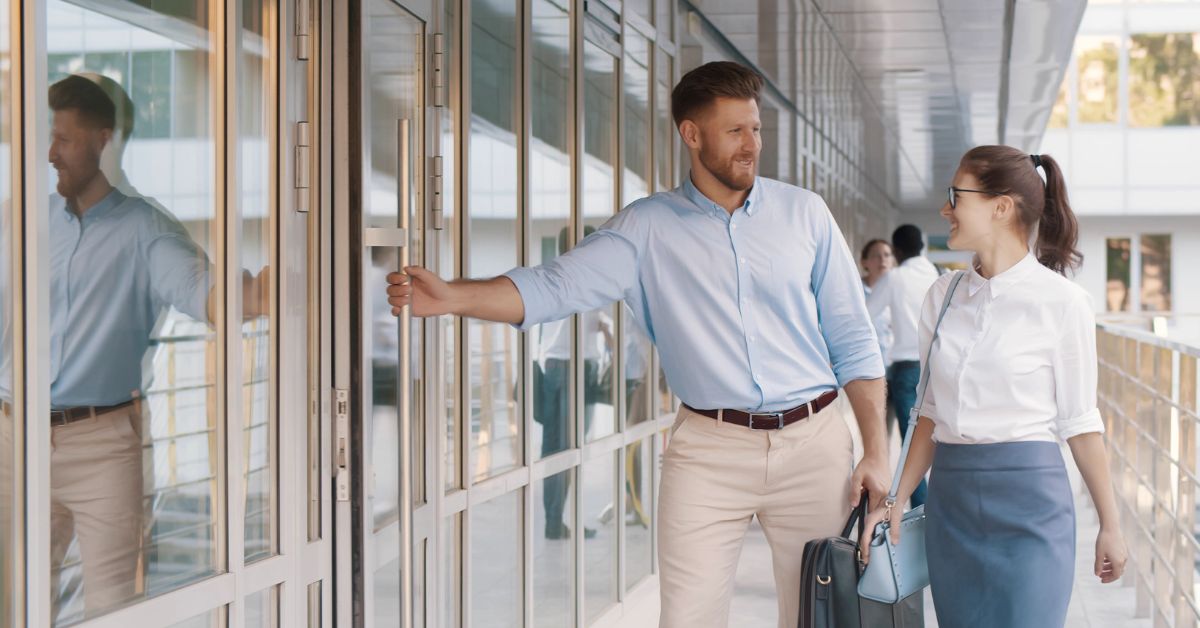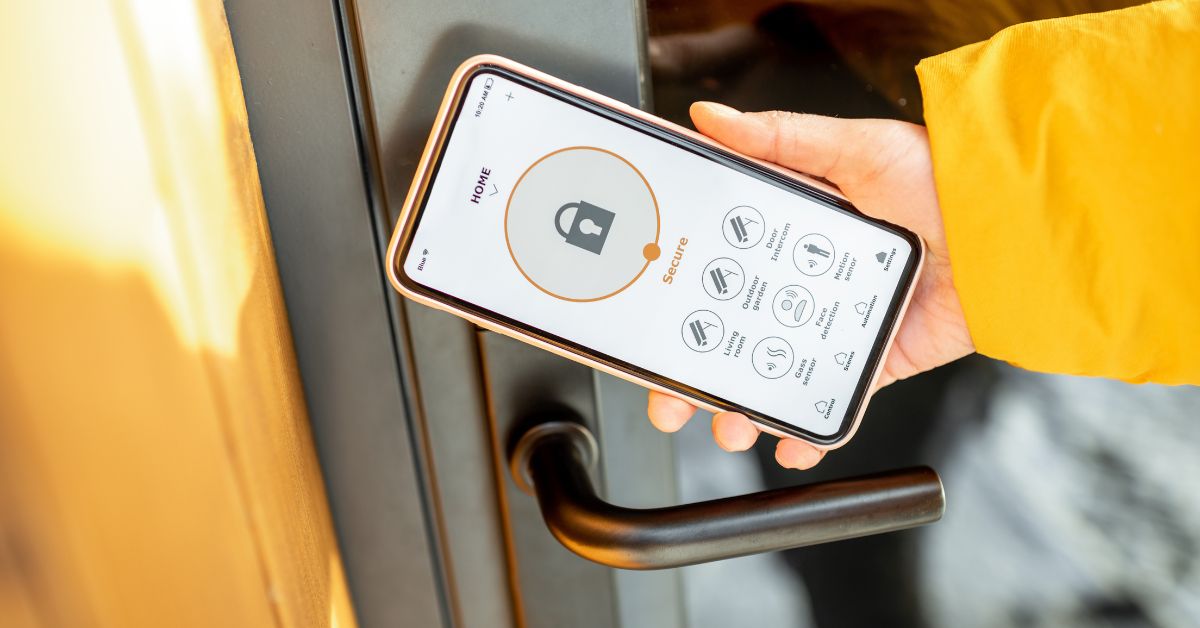7 Tips for Upgrading Your Commercial Doors

Why Upgrade Your Commercial Doors?
Outdated, damaged, or inefficient doors can leave customers or potential employees with a poor impression of your business. Even more, low-quality doors can seriously compromise the functionality and safety of your space.
With modern commercial doors, you can improve security and energy efficiency while creating a seamless aesthetic. Whether you’re renovating or simply improving, upgrading your doors is a smart move for safety, cost savings, and customer experience.
1. Define Your Needs
Every business has unique door requirements. Are you looking for increased durability, better insulation, or enhanced security? Consider form and function before making a decision.
For instance, retail spaces should focus on secure doors that also look inviting to clients. Glass storefront doors with extra durability may work well since they offer safety and a professional appearance.
As for warehouses, in high-traffic areas, sturdy metal doors or roll-up models can withstand the constant movement of goods. Restaurants or cafés should use energy-efficient doors to help with temperature control while maintaining aesthetics that match the dining atmosphere.
By clearly defining your needs, you can streamline your search and find solutions that fit your business’s purpose.

2. Select the Right Material
The type of material you choose for your commercial doors impacts durability, energy efficiency, and appearance. Some popular materials include:
- Steel: Known for its strength and security, steel works great in warehouses, industrial settings, and back-of-house entrances. Due to its impact resistance, steel is a reliable long-term door choice.
- Aluminum glass: This form of aluminum works for retail spaces or office entrances that must combine professionalism and transparency. It’s a sleek option that’s stylish and durable.
- Wood: For indoor locations or low-traffic areas, wood doors offer classic charm to any space. However, even treated wood requires regular maintenance.
- Fiberglass: Lightweight yet durable, fiberglass is perfect for locations requiring weather resistance. It’s especially beneficial in geographical areas prone to extreme weather conditions.
Always take into account the level of wear and tear your doors will experience daily as you compare materials.
3. Upgrade to Current Safety Standards
Older doors may not meet current building codes, so consider upgrading to models that comply with fire safety and Americans with Disabilities Act (ADA) requirements. For instance, fire-rated doors protect critical areas in your building. These doors are designed to withstand high temperatures and delay the spread of fire.
ADA-compliant doors provide easy access due to their sufficient width, low thresholds, and automated or handicapped-accessible options. These features improve accessibility for all users, which is a legal and ethical priority.
By prioritizing safety during your upgrade, you’ll protect employees and customers while mitigating potential risks. A safe, compliant door establishes trust and helps you adhere to regulations.
4. Replace Commercial Door Hardware
When upgrading your doors, never overlook the hardware. Handles, hinges, locks, and closers impact functionality and security. Consider the following factors when replacing commercial door hardware:
- Handles and levers: Consider ergonomics and design, particularly in high-use environments, and choose durable materials like stainless steel for longevity.
- Locks and access controls: Modern access systems allow you to integrate keypads, fingerprint scanners, or even smartphone locks for added convenience and safety. These solutions can reduce reliance on physical keys, minimizing security risks.
- Hinges: Reinforced hinges prevent wear and distribute the door’s weight evenly, which is essential for heavy steel or glass doors.
- Door closers: Use adjustable closers to maintain smooth door movement, prevent slamming, and prolong the overall lifespan of your door.
Expertly chosen hardware complements your door upgrade and amplifies its functionality. Contact a reputable commercial door hardware supplier like DoorHub to take this essential step.
5. Prioritize Security
Your commercial doors are the first line of defense for your business, so always prioritize security upgrades like these:
- Impact-resistant features: Look for reinforced doors or shatterproof glass models to deter theft or break-ins. These features offer peace of mind, especially in high-risk areas.
- Enhanced locking mechanisms: Smart locks or commercial-grade deadbolts reduce vulnerability to theft by providing superior defense compared to traditional locks.
- Surveillance integration: Modern doors can incorporate security cameras or video monitors for extra peace of mind and business security strategy optimization.
With the right security upgrades, you’ll protect your assets and reassure your employees and customers by providing a safe environment.

6. Focus on Energy Efficiency
Don’t underestimate the value of energy-efficient doors; these upgrades can save businesses in utility expenses annually. Materials like fiberglass and steel come with insulation for better temperature control, reducing heating and cooling costs while maintaining comfort inside.
Installing weather strips or seals can prevent drafts and leaks, especially in climate-sensitive industries like restaurants and warehouses. Affordable and effective, this upgrade is a great way to improve door performance.
You should also be choosy about glass coatings. For glass doors, opt for low-emissivity (Low-E) coatings to reduce heat transfer without sacrificing visibility. This feature enhances indoor comfort while keeping energy costs under control. Energy-efficient doors support sustainability goals while cutting down on operational expenses. Plus, these upgrades deliver short-term savings and long-term value.
7. Hire a Professional Installer
DIY might seem tempting to save costs, but misaligned doors or faulty installations can lead to long-term problems like air leaks or structural issues. A poorly installed door may also void your warranty, leaving you with extra costs. Avoid the financial stress by hiring a professional to get the job done right.
Get the Most From Your Commercial Doors
Upgrading your commercial doors helps you improve the functionality, security, and overall impression of your business space. With these seven tips for upgrading your commercial doors, you have the tools and knowledge you need to invest in a better, more effective workplace.
If you’re ready to explore upgrade options, DoorHub is an excellent place to start. Take a look at our options to find an entryway solution that perfectly suits your needs.

Author
Greg Richard
Chief Technical Officer and Founding Member of DoorHub.com